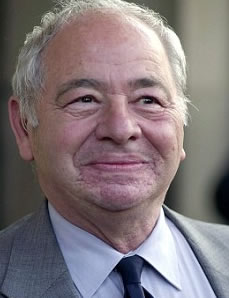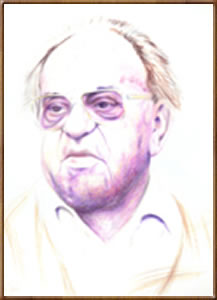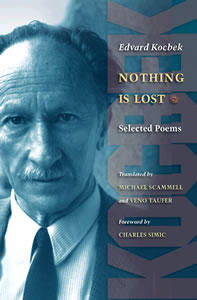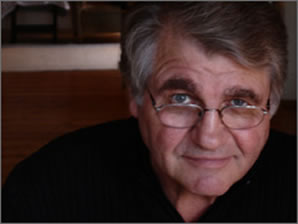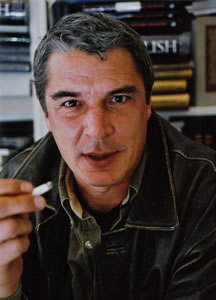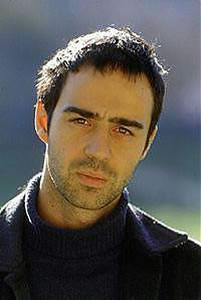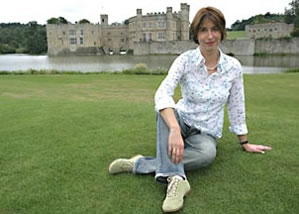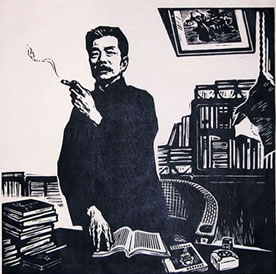De Amerikaanse schrijver Truman Capote werd geboren op 30 september 1924 als Truman Streckfus Persons in New Orleans. Zie ook mijn blog van 1 oktober 2006 en ook mijn blog van 30 september 2007 en ook mijn blog van 30 september 2008.
Uit: Too Brief a Treat: The Letters of Truman Capote
„TO CATHERINE WOOD [Monroeville, Ala.] [26 July 1941]
Dear Miss Wood, I have been in New Orleans three weeks and I just got back to Monroeville last night. I was very pleasantly surprised to find your sweet note. I was so sorry to hear about your father and I do hope he is improving.I have been gathering material here and there and some of it is rather good, I have written little but I have taken many notes and tried to give accurate accounts of things that will later stand me in good stead, (that was meant to be a period, but my typewriter slipped.)
Are you going up to visit Miss Pierce, I hope you do because her place in Maine sounded so quiet and restful-charmingly woodsy.
I have been traveling all over the south since I came. I went to Natchez, Miss. last week and I went on a picnic at a very scenic spot over looking [sic] the Mississippi River.
Teddy’s mother wrote me a long letter telling me all about his doings, you know Teddy-he would’nt [sic] write anyone if his very life depended upon it. She told me that you had written him and asked me to tell you all the news about the dear raven haired child.
1.He has a job with the Greenich [sic] Cab company and he makes fifteen dollars week.
2.He won $130.00 dollars [sic] at the Maidstone club dinner dance. He is taking flying lessons with it.
3.His mother is desperate!
4.They have moved into their new house-the address is 179 Park Ave. Greenwich.
5.They are pleased and delighted with Teddy and he seems to be improving. BUNK!
P.S. He was 17 last Sat.
I have gone Russian with a vengeance! I finally finished WAR and Peace. Also I have read Huxley’s “Point Counter Point.” It is very badly written, not so badly written as confusing. But it is educating as to the point of ultra-modern sophistication.
I went all the way through the heart of Pearl River swamp in La. It took three days and it was like being in a jungle only more dangerous. These swamps are inhabited by Cajons (I believe that I spelled that correctly) and it is so wild in there that some of the younger children have never seen white people! It was really quite an experience and I collected all kinds of material and wild flowers-also a baby alligator which I will ship to you C.O.D any time that you will have him. He’s a regular little monster.
I am so sorry for my procrastination in answering your letter but it was truly unavoidable. Please write me and tell me all the news as I am at present sorta this side of civilization, where the people think if you don’t say “ain’t” you just ain’t right in the head and the double negative is accepted grammar.
Write me, all my very best Love, Truman“

Truman Capote (30 september 1924 – 25 augustus 1984)
De Nederlandse dichter en schrijver Hendrik Marsman werd geboren op 30 september 1899 in Zeist. Zie ook mijn blog van 30 september 2006 en ook mijn blog van 30 september 2007 en ook mijn blog van 30 september 2008.
Herinnering aan Holland
Denkend aan Holland
zie ik brede rivieren
traag door oneindig
laagland gaan,
rijen ondenkbaar
ijle populieren
als hoge pluimen
aan de einder staan;
en in de geweldige
ruimte verzonken
de boerderijen
verspreid door het land,
boomgroepen, dorpen,
geknotte torens,
kerken en olmen
in een groots verband.
De lucht hangt er laag
en de zon wordt er langzaam
in grijze veelkleurige
dampen gesmoord,
en in alle gewesten
wordt de stem van het water
met zijn eeuwige rampen
gevreesd en gehoord.
Zonnige septembermorgen
De zomer en de late rozen
zijn zacht ontblaadrend uitgebloeid;
het bloedend vuur, het hete blozen
tot oud oktobergoud vergloeid.
de groene vlammen van de bomen
– bestorven bruin en wingerdrood –
zijn van hun donkre drift benomen
o dag, o droom van blauw en goud!
het licht hangt in de honingraten
der vensters als een vochtig vlies
en morgenzon in de gelaten
waarin bij nacht de droefheid wies.
o zijden zonlicht, zacht kristal
hoe onbeschrijflijk mild en edel
verzilvert gij het smal ravijn
der huizen en de ranke schreden
der meisjes langs de waterval
en langs de gracht en op de bruggen
die teer gebogen ruggen
welven over het fulpen waterdal;
de kinderen vangen met hun handen
de zachte speren; en hun mond
vangt het geluk met open tanden
van dauw en vochte morgenstond.
o witte wel, o waterval
omhuiverd door die vroege tent
van hemelsblauw, o firmament
dat koel en diep doorschijnend is;
genees mijn hart dat in de zomer
zo ruw en rood gehavend werd;
genees het in het klare stromen
voordat het droef en avond wordt.
Zonder weerklank
Volk, ik ga zinken als mijn lied niet klinkt;
ik moet verdrogen als gij mij niet drinkt;
verzwelg mij, smeek ik – maar zij drinken niet;
wees mijn klankbodem, maar zij klinken niet.

Hendrik Marsman (30 september 1899 – 21 juni 1940)
De Perzische dichter en soefistisch mysticus Jalal ad-Din Rumi (of Roemi) werd geboren op 30 september 1207 in Balkh. Zie ook mijn blog van 30 september 2007 en ook mijn blog van 30 september 2008.
Uit: Juwelen (VI:4094-4106)
Alle zelfzuchtige pleziertjes zijn bedrog en oplichterij,
die lichtflits wordt omgeven door een muur van duisternis.
De bliksemschicht is maar van korte duur
en je hebt, door duisternis omgeven, nog een lange weg te gaan.
Bij dat licht kun je geen brief lezen
en evenmin naar je bestemming rijden.
Maar doordat jij je door de lichtflits laat misleiden,
trekken de zonnestralen zich van je terug.
Mijl na mijl leidt het bedrog van de lichtflits
je `s nachts zonder gids dieper in een donkere wildernis.
Het ene moment val je tegen een berg, het volgende in een rivier,
nu eens dwaal je hier rond, dan weer daar.
Zoeker van wereldse waardigheid, je vindt de gids nooit
en als je hem vindt, keer je je van hem af
met de woorden: `Zestig mijl heb ik al op deze weg afgelegd
en nu zegt deze gids dat ik de weg kwijt ben.
Als ik gehoor geef aan zijn wonderlijke raadgeving,
moet ik de reis opnieuw aanvangen onder zijn hoede.
Ik heb mijn leven gewijd aan deze reis.
Laat maar zitten. Wat komt, komt. Ga weg, meester!’
`Ja, je hebt al een hele reis achter de rug,
maar eigengereidheid levert net als de lichtflits weinig op.
Kom, leg een tiende van die reis af
omwille van de luisterrijke zon van goddelijke inspiratie.
Je las het vers: ‘Vermoedens wegen niet op tegen de waarheid’,
maar toch werd je door zo’n lichtflits blind voor het licht van de
zon.
Luister, stap in onze boot, arme stakker,
of leg in elk geval die boot van jou vast aan die van ons.’

Roemi (30 september 1207 – 17 december 1273)
De Joods-Roemeens-Frans-Amerikaanse schrijver Eli Wiesel werd geboren op 30 september 1928 in Sighet (nu Sighetu Marmaţiei), Roemenië. ook mijn blog van 30 september 2007 en en ook mijn blog van 30 september 2008.
Uit: And the Sea is Never Full
„Benno Werzberger in Israel, Tadeusz Borowski in Poland, Paul Celan and Piotr Rawicz in Paris, Bruno Bettelheim in the United States, Primo Levi in Italy–the writers who were part of the shrinking community of Holocaust survivors endured severe hardship. Despairing of the written word’s power, some chose silence. The silence of death.
Was it because as guardians of memory they felt misunderstood, unloved, exiles in the present, guilty of having failed in their task? Were they afraid of having spoken too much–or not enough? In light of the tragedies that continue to tear apart society, did they admit defeat?
I knew three of them well. Their final acts continue to haunt me.
Primo Levi, speaking of “experts” on the Holocaust, said “They are the thieves of Time; they infiltrate themselves through keyholes and cracks and cart off our memories without leaving a trace.”
Why did Primo, my friend Primo, fling himself from the top of a staircase, he whose works finally succeeded in shaking public indifference, even outside Italy?
From our first meeting in Milan, during the seventies, we had formed bonds. In a way we were meeting again, having already “met.” Over there, in Buna. I had spent some time in his barracks. I had seen him without seeing him. He had crossed my path without noticing me. Even over there, social differences existed.
Now, transcending frontiers, we moved forward side-by-side as we clung to our links to those who had abandoned us. Was it he or I who said “Maybe I’m dead and don’t know it.” Like him I was convinced that our experiences isolated us, that people living today or tomorrow could never understand their nature.
When we turned our gaze inward we saw the same universe. The selections, the kommandos, the “roll calls” in the icy wind, the hanging of the young boy, a member of the underground–yes, he remembered it all as I did. Sometimes he would question me about a sentence of mine he had read somewhere; I told him I was a bad interpreter of my writings. I did better commenting on his.“

Eli Wiesel (Sighet, 30 september 1928)
De Nederlandse (gelegenheids-)dichter, (sport)journalist, televisiepresentator en columnist Henk Spaan werd geboren in Heerhugowaard op 30 september 1948. Zie ook mijn blog van 30 september 2008.
Ruud van Nistelrooij
Op de website van de heilige
Maria Magdalena-kerk in Geffen
Vind je, naast honderdvijftig foto’s
Van het huwelijk op 10 juli 2004
Van Leontien en Ruud en
Een uitgebreid beeldverslag van de
Parochiereis naar Lourdes –
Uiteraard ontbreekt de rolstoel niet –
Honderdnegentig foto’s van het
Misdienaarskamp tweeduizendvijf
Radeloze nietszeggendheid met
Uitzondering van foto 84 waarop:
Een schaal hamburgers
Een schaal frikandellen
En achttien rookworsten
Hoofdschotels van een Brabants
Avondmaal in het rijke, roomse leven.

Henk Spaan (Heerhugowaard, 30 september 1948)
De Duitse schrijver, draaiboekauteur en DDR-dissident Jurek Becker werd geboren op 30 september 1937 in Łódź, in Polen. Zie ook mijn blog van 30 september 2008.
Uit: Jakob der Lügner
“Dann ist Frankfurter mit seiner Frau alleine, ohne Zeugen. Ich weiß bloß, wie es ausgegangen ist, ich kenne nur das Resultat, nichts dazwischen, aber ich kann es mir nur so oder ähnlich vorstellen.
Die Frau steht endlich auf, irgendwann. Sie wischt sich die Tränen weg, nicht mehr die vom Heiratsantrag, oder sie wischt sie nicht weg, sie geht zu ihrem Mann, leise, als wollte sie ihn nicht stören. Sie stellt sich hinter ihn, legt ihm die Hände auf die Schultern, sie bringt ihr Gesicht dicht an seins, das noch immer von den Händen verdeckt wird, und wartet. Auch als seine Arme heruntersinken nichts, er starrt auf die gegenüberliegende Wand, und sie stößt ihn leic
ht an. Sie sucht etwas in seinen Augen und kann es nicht finden.
“Felix”, könnte sie nach einer Weile leise gesagt haben, “freust du dich denn nicht? Bezanika ist doch nicht so unendlich weit. Wenn sie bis dort gekommen sind, dann kommen sie doch auch bis zu uns.”
Oder sie könnte gesagt haben: “Stell dir vor, Felix, wenn das wahr ist! Mir dreht sich der Kopf, stell dir das doch bloß vor! Nicht mehr lange, und alles wird wieder sein wie früher. Du wirst wieder spielen können, auf einer richtigen Bühne, unser Theater wird bestimmt neu aufgemacht, ich werde dich nach jeder Vorstellung abholen, neben der Anschlagtafel an der Pförtnerloge werde ich auf dich warten. Stell dir das bloß vor, Felix!”
Er antwortet nicht. Er steht unter ihren Händen auf und geht zum Schrank. Vielleicht sieht er aus wie ein Mann, der einen wichtigen Entschluss gefasst hat und keine Zeit mehr verlieren will, ihn auszuführen.
Frankfurter öffnet den Schrank, nimmt eine Tasse oder ein Kästchen heraus und findet darin den Schlüssel.
“Was willst du im Keller?” fragt sie.
Er wiegt den Schlüssel in der Hand, als ob noch etwas zu bedenken wäre, die Frage nach dem Zeitpunkt womöglich, aber je eher, desto besser, nichts gilt mehr. Vielleicht sagt er ihr jetzt schon, was er vorhat, noch im Zimmer weiht er sie ein, aber das ist unwahrscheinlich, er hat sie nie groß um ihre Meinung gebeten. Außerdem ist ganz und gar unwichtig, wann er es ihr sagt, geändert wird dadurch nichts, der Schlüssel ist schon in seiner Tasche. Nehmen wir also an, er schließt wortlos den Schrank, geht zur Tür, dreht sich dort zu ihr um und sagt nur: “Komm.”
Sie gehen in den Keller.
Armeleutehäuser, in die man früher nie den Fuß gesetzt hätte, die Holzstufen sind ausgetreten, sie knarren wie verrückt, aber er geht dicht an der Wand und auf Zehenspitzen. Sie folgt ihm beunruhigt, auch leise, auch auf Zehenspitzen, sie weiß nicht warum, er tut es eben auch. Sie ist ihm bisher immer gefolgt, ohne zu fragen, sie hat oft nur erraten, was zu tun sei, es war nicht immer gut.”

Jurek Becker (30 september 1937 – 14 maart 1997)







